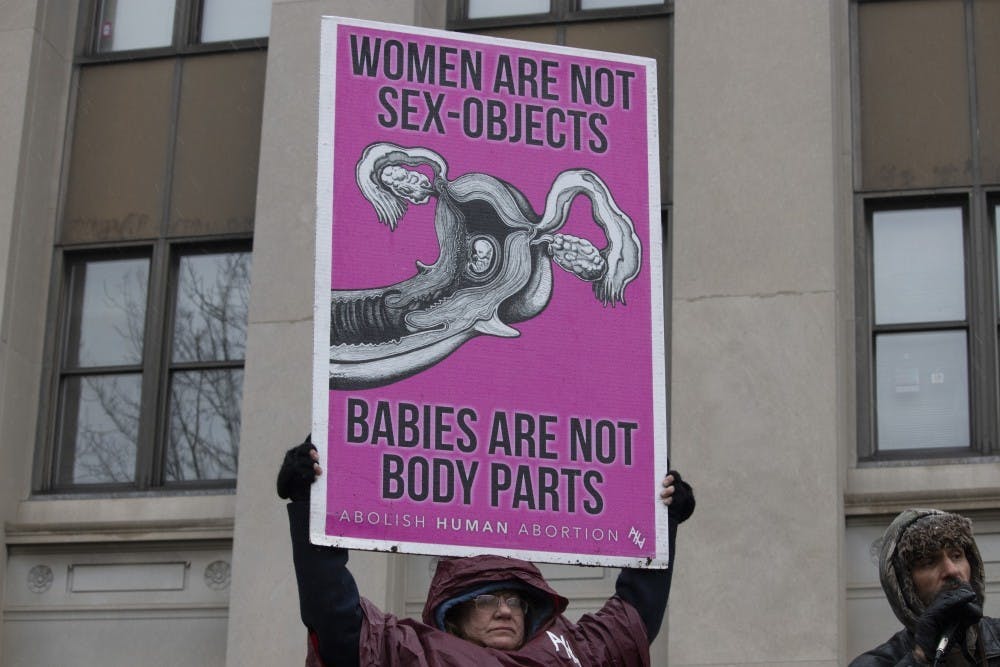IU sophomore Olivia Moore remembers the moment she saw the news about Texas’s law that prohibits abortions after six weeks of pregnancy.
Sitting in one of the quiet rooms in the Franklin Hall lobby in a Zoom class, she saw the news on the big screen and turned off her camera as she covered her mouth and gasped.
“It’s an incredible threat to women, nonbinary people and trans men everywhere,” Moore said. “For people to think it’s okay to take away our bodily autonomy like that, it’s absolutely mindblowing.”
Texas Gov. Greg Abbott signed a bill into law stating abortions would be prohibited as early as six weeks into a pregnancy. Opponents view this as one of the strictest laws in Texas since the Roe v. Wade decision, according to The Texas Tribune. According to NPR, Abbott defended this law in a press conference, responding to concerns that the Texas law does not have exceptions for rape cases.
"Texas will work tirelessly to make sure that we eliminate all rapists from the streets of Texas by aggressively going out and arresting them and prosecuting them," Abbott said in the conference.
Moore said this law leaves little room for error, like if a young girl were to be raped and not realize she was pregnant within the six week time period. Most women don’t know they’re pregnant this soon into their pregnancy.
“I can’t even imagine how everybody feels in Texas that owns a uterus,” Moore said. “I can’t even imagine having to go through that.”
This wasn’t completely unexpected, IU junior Mackenzie Lewis said. She said she wouldn’t be surprised if a similar law is replicated in Indiana soon, since it’s a majority conservative state.
“I think it is reprehensible and awful but I’m also not surprised about it,” Lewis said. “I think we’ve all known that this has been coming for a long time.”
IU freshman Kylie Heppner said the people supporting this law aren’t looking at the bigger picture. For example, the children who will be born as a result of the abortion ban could end up with parents who cannot adequately care for the child, Heppner said.
“We need to think about the babies outside of wombs and outside of foster care who are treated awfully,” Heppner said. “The pro-lifers aren’t actually pro-life, they’re pro-control.”
She said no one should deny women the right to make decisions for their own bodies no matter someone’s views, whether religious, moral or political.
“I feel that the new Texas law is a huge violation of basic human rights,” Heppner said. “No matter what your religion or your basic moral values tell you to believe about abortion, I feel like we can’t deny women that right because it’s their body.”
Oct. 2 is named a nationwide protest day for the Women’s March so people can show their opposition to the law.
When Heppner pledged to participate in the nationwide event, she said the Women’s March emailed her back asking if she wanted to organize a march in Bloomington. She has been working to gain support for a local march in the IU community by posting in the class of 2025 Facebook group and creating a GroupMe for everyone interested.
She said she feels this protest is necessary to educate the community and spread awareness for possible outcomes of the law, like more states adopting similar laws. She said she doesn’t want the march to attack anyone’s beliefs, but rather make people realize what this law means for people with a uterus.
“People expect us to attack those who oppose us,” Heppner said. “It’s more about just trying to educate and make people realize, rather than forcing what we believe onto them.”




